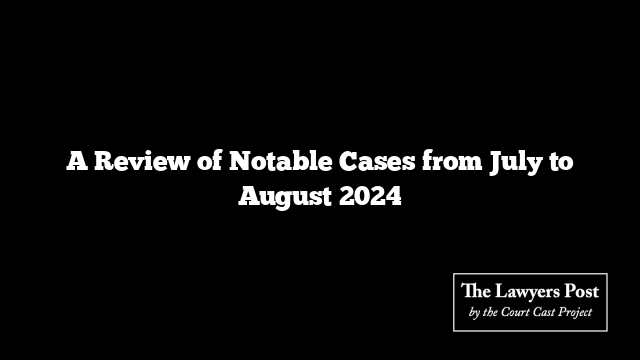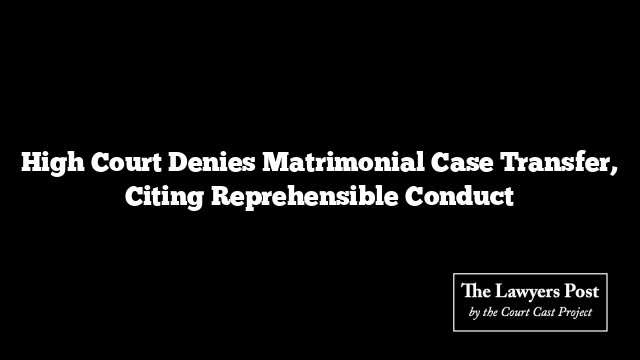This post in the conspectus provides a detailed overview of significant cases from various courts across India, focusing on what happened in each case and its implications.
1. Kush Kalra v. UoI And Anr. (Supreme Court): The Supreme Court dismissed a petition challenging the gender-discriminatory provision in Section 64 of the Code of Criminal Procedure, which allowed only male family members to accept summons. The Court noted that this provision had been removed in the newly enacted Bharatiya Nagarik Suraksha Sanhita (BNSS) 2023, rendering the petition moot.
2. Research In Human Dna. It vs Unknown (Calcutta High Court): The Calcutta High Court stressed the need for capacity building in forensic sciences to effectively implement the provisions of the BNSS. The court highlighted the inadequacy of existing forensic science laboratories (FSLs) and emphasized the importance of integrating scientific advancements into criminal investigations to improve the quality of justice.
3. SH. ANUPAM GAHOI v. STATE (GOVT. OF NCT OF DELHI) AND ANR (Delhi High Court): The Delhi High Court ruled that pleas to quash FIRs filed after July 1, 2024, should be governed by the BNSS rather than the CrPC. The court’s decision clarified the procedural transition between the old and new codes, setting a precedent for how ongoing cases should be handled under BNSS.
4. PRINCE v. STATE OF GOVT OF NCT OF DELHI & ORS. (Delhi High Court): The Delhi High Court held that anticipatory bail applications filed after the enforcement of BNSS should be governed by the new code, even if related to FIRs lodged under the Indian Penal Code (IPC). This ruling provided clarity on the applicability of BNSS to cases involving anticipatory bail, emphasizing the importance of following the new procedural laws.
5. Shri S. Rabban Alam v. CBI Though Its Director (Delhi High Court): The Delhi High Court interpreted Section 531(2)(a) of BNSS, stating that appeals pending before the enforcement of BNSS should continue under the CrPC. The court’s interpretation of this transitional provision provided crucial guidance on how appeals filed before the new code’s enforcement should be treated.
6. BANTU v. STATE GOVT OF NCT OF DELHI (Delhi High Court): The Delhi High Court observed that BNSS heralds a transformative era in criminal justice, emphasizing transparency, accountability, and alignment with fairness principles. The court’s recognition of BNSS’s role in modernizing the legal framework underscores its impact on the criminal justice system.
7. M/S KG MARKETING INDIA v. MS. RASHI SANTOSH SONI & ANR. (Delhi High Court): The Delhi High Court, for the first time, referred to BNSS while dealing with a forgery case in a trademark dispute. This case marked an early application of BNSS in civil matters, expanding its relevance beyond traditional criminal cases and highlighting its broader impact on various legal contexts.
8. Tavaragi Rajashekhar Shiva Prasad AND State of Karnataka (Karnataka High Court): The Karnataka High Court ruled that a summons issued under Section 35 of BNSS without the crime number or details of the alleged offence does not require compliance. This decision emphasized the need for law enforcement to follow proper procedural protocols under BNSS, safeguarding citizens’ rights against improper summonses.
9. Ajay Kumar Behra AND State of Karnataka (Karnataka High Court): The Karnataka High Court urged the Central Government to amend Section 184 of BNSS to mandate that adult rape victims be examined only by female practitioners to protect their privacy. The court’s ruling called for legislative changes to better safeguard the rights of victims in sensitive cases, particularly those involving sexual assault.
10. Crl.A. No. 1186 of 2024 (Kerala High Court): The Kerala High Court ruled that appeals filed after July 1, 2024, must be governed by BNSS, regardless of when the conviction occurred. This decision clarified the retrospective application of BNSS in appellate proceedings, setting a precedent for how new laws should be integrated into ongoing legal processes.
11. XXX v. XXXX (Punjab & Haryana High Court): The Punjab and Haryana High Court held that if a FIR is lodged under IPC but the application or petition is filed after July 1, 2024, the provisions of BNSS will apply. This case clarified the procedural transition from CrPC to BNSS, impacting how FIR-related cases are handled under the new code.
12. Krishna Joshi v State of Rajasthan & Ors. (Rajasthan High Court): The Rajasthan High Court ruled that investigations and trials related to FIRs lodged before July 1, 2023, should continue under CrPC rather than BNSS. This decision provided important guidance on the application of old versus new procedural laws during the transition to BNSS.
13. BRS Ventures Investments Ltd. v. SREI Infrastructure Finance Ltd. & Anr. (Supreme Court): The Supreme Court held that a holding company’s resolution plan cannot include the assets of its subsidiary, reinforcing the legal separation between holding and subsidiary entities. This ruling reaffirmed the principle of corporate separateness, which is crucial in corporate insolvency resolutions.
14. Pitambar Solvex Pvt Ltd And Anr. vs. Manju Sharma And Ors. (Delhi High Court): The Delhi High Court ruled that the initiation of arbitration proceedings does not bar a corporate debtor from pursuing remedies under the Insolvency and Bankruptcy Code (IBC). The court’s decision reinforced the autonomy of insolvency proceedings under IBC, even in the presence of parallel arbitration.
15. IIFL Home Finance Ltd. vs. Shiv Nandan Sharma, Resolution Professional Saha Infratech Pvt. Ltd. (NCLAT Delhi): The NCLAT ruled that lending institutions providing loans to homebuyers do not qualify as financial creditors under IBC. This ruling clarified the classification of creditors under IBC, which is essential for the resolution process, particularly in real estate insolvencies.
16. Rita Malhotra & Anr. vs. Orris Infrastructure Pvt. Ltd. (NCLAT Delhi): The NCLAT held that creditors who are allotted commercial space constitute an ‘allottee’ under both RERA and IBC. This decision harmonized the interpretation of ‘allottee’ status across different regulatory frameworks, influencing how claims are treated in insolvency cases involving real estate.
17. Iskon Infra Engineering Private Limited vs. Central Bank of India (NCLAT Delhi): The NCLAT ruled that a corporate guarantor cannot be absolved of liability due to the non-invocation of the guarantee. This case reaffirmed the continuing liability of corporate guarantors, even when guarantees are not invoked, impacting guarantee enforcement under IBC.
18. A. Vijayan v. Silver Line Retreat Hotels Private Limited (NCLAT Chennai): The NCLAT criticized the unnecessary burdening of the tribunal with voluminous appeal records, stressing the importance of efficiency in case management. This ruling promoted judicial efficiency by discouraging the filing of excessive documentation in appellate proceedings.
19. Swan Energy Ltd. vs Chandan Prakash Jain and Ors. (NCLAT Delhi): The NCLAT held that a resolution applicant not included in the initial list of prospective applicants cannot be substituted later in the process. This decision upheld the integrity of the resolution process, ensuring that only qualified and timely applicants are considered.
20. Jet Aircraft Maintenance Engineers Welfare Association Versus Mr. Ashish Chhawchharia (NCLAT Delhi):The NCLAT ruled that a resolution professional is not personally liable for payments made to employees during the corporate insolvency resolution process (CIRP). This case clarified the limited liability of resolution professionals, protecting them from personal financial responsibility during CIRP.
21. Sanskriti Allottee Welfare Association (Reg.) & others Versus Gaurav Katiyar & anr (NCLAT Delhi): The NCLAT upheld the decision to increase maintenance charges during CIRP to cover essential services like electricity. This ruling reinforced the necessity of maintaining essential services during insolvency proceedings, even if it required increased charges for homebuyers.
22. Piramal Capital and Housing Finance Limited vs Notion Real Estate Pvt. Ltd. (NCLT Mumbai): The NCLT ruled that Insolvency Professional Entities (IPEs) are qualified to be appointed as resolution professionals under IBC. This decision affirmed the role of IPEs in the insolvency process, expanding the pool of professionals eligible for appointments.
23. Ericsson India Private Limited vs. Reliance Communications Limited (NCLT Mumbai): The NCLT held that excluding the stay period of a CIRP petition does not postpone the insolvency commencement date. This ruling clarified the interpretation of CIRP timelines, ensuring that the commencement date remains unaffected by procedural delays.
24. State Bank of India vs. Navjeevan Tyres Private Limited (NCLT Mumbai): The NCLT ruled that a notice to a corporate debtor recalling a loan does not constitute a demand on the corporate guarantor. This decision emphasized the distinction between demands on debtors and guarantors, influencing how financial obligations are enforced.
25. Sanjeev Mahajan vs. Indian Bank (Erstwhile Allahabad Bank) & Anr. (NCLT Delhi): The NCLT ruled that settlement proposals cannot be considered after the approval of a resolution plan by the Committee of Creditors. This decision reinforced the finality of resolution plans once approved, preventing post-approval settlements from disrupting the process.
26. Rameshwar Singh Versus Ocean Seven Buildtech Pvt. Ltd. A/w 14 others (Haryana RERA): Haryana RERA directed the builder to pay interest to 15 homebuyers for delayed possession in the Expressway Towers project. This ruling emphasized the obligation of builders to deliver possession on time, with financial consequences for delays.
27. Sanjay Versus M/s Czar Buildwell Pvt. Ltd (Haryana RERA): Haryana RERA ordered the builder to refund the homebuyer after revoking the project’s registration due to violations of RERA. This decision showcased the regulatory power of RERA in protecting homebuyers’ interests by enforcing compliance with real estate laws.
28. Dr. Dolly Chopra Versus M/S Vatika Limited (Haryana RERA): Haryana RERA directed the builder to refund the amount paid by the complainant after an eight-year delay in handing over possession. This ruling underscored the importance of timely project completion and the serious consequences for builders who fail to meet deadlines.
29. Sh. Muthunayagom Gaudama Vasan Versus M/s Emaar Mgf Land Ltd. (Haryana RERA): Haryana RERA ordered the builder to refund ₹1.30 crores with interest to a homebuyer for a villa purchase in the Marbella Project due to delayed possession. This decision highlighted the enforcement of contractual obligations under RERA, ensuring that homebuyers receive restitution for undue delays.
30. Mr. Atul G Sharma & others Versus Adani Estates Pvt. Ltd. (MahaREAT): MahaREAT directed the builder to pay interest to homebuyers for delayed possession, overruling an earlier dismissal by MahaRERA. This case reinforced the appellate authority’s role in ensuring that homebuyers receive just compensation for project delays.
31. Ajay Versus M/s. Lucina Land Development Limited A/w another (MahaREAT): MahaREAT held that homebuyers can file concurrent complaints before RERA and the Consumer Court, but must choose one forum if seeking similar reliefs. This decision clarified the Doctrine of Election, ensuring that homebuyers do not pursue identical claims in multiple forums, thus preventing double recovery.
32. Madhuparni Roy Versus Shrivision Towers Private Ltd. (Karnataka RERA): Karnataka RERA directed the builder to pay interest to a homebuyer for delayed possession of a flat. This ruling reinforced the obligation of builders to adhere to possession timelines, with financial penalties for non-compliance under RERA.
33. Mallikarjuna Js & another Versus Mantri Technology Constellations Pvt. Ltd. (Karnataka RERA): Karnataka RERA ordered the builder to refund the homebuyer after a four-year delay in completing the project. This decision emphasized the protection offered to buyers under RERA and the consequences for builders who fail to complete projects on time.
34. Vinod Padmakant Parekh & anr Versus M/s Heena Builders & Developers A/W 2 others (Maharashtra RERA): Maharashtra RERA ordered the builder to pay interest to the homebuyer for delayed possession of flats in Gokul Silvermist. This ruling highlighted the enforcement of contractual commitments in real estate projects, ensuring buyers’ financial interests are safeguarded.
35. M.Sathvika Versus M/s Jayathri Infrastructures India Pvt Ltd A/w 13 others (Telangana RERA): Telangana RERA ordered the builder to refund the homebuyers and imposed a penalty for selling an unregistered project. This case exemplified the stringent enforcement of registration requirements under RERA, protecting buyers from unregistered projects.
36. Sri Abdul Wahid Versus M/s Jayathri Infrastructures India Pvt Ltd A/W 3 others (Telangana RERA):Telangana RERA ordered the builder to refund four homebuyers and imposed a penalty for selling an unregistered project. This ruling reiterated the importance of project registration under RERA, with financial penalties for non-compliance.
37. Twinkle Preethy Sivakumar Versus M/s. Alliance Villas Pvt Ltd. (Tamil Nadu RERA): Tamil Nadu RERA ordered the builder to refund the full amount paid by the homebuyer without charging any cancellation fee. This case highlighted the protection of buyers’ rights in contract cancellations, ensuring fair treatment under RERA.
38. Maharashtra State Road Transport Corporation v. Dattatraya Ganpat Bankhele (Bombay High Court): This case addressed the issue of employment termination and the rights of workers under the Bombay Industrial Relations Act. The court ruled in favor of the worker, reinforcing protections for employees under labor laws.
39. Sumit Suresh More v. State of Maharashtra (Bombay High Court): This criminal appeal involved the validity of evidence collected during a search and seizure operation. The court upheld the trial court’s decision, emphasizing the importance of following proper legal procedures during searches.
40. Nijam Asgar Hashmi v. State of Maharashtra (Bombay High Court): The High Court suspended a life sentence and granted bail to a man convicted of beheading his girlfriend’s cousin, citing discrepancies in the prosecution’s case. This ruling highlighted the importance of ensuring the accuracy and consistency of evidence in criminal trials.
41. Jesmon Joy Karippery v State of Kerala (Kerala High Court): The Kerala High Court ruled that onerous conditions are not necessary when an accused seeks renewal of a passport without permission to go abroad. This case clarified the conditions under which passports can be renewed for accused persons.
42. XX v State of Kerala (Kerala High Court): The court noted the misuse of the POCSO Act in matrimonial disputes to deny custody to the father. The ruling emphasized the need for careful judicial scrutiny in cases involving allegations under POCSO.
43. Rajesh Gopalakrishnan v State of Kerala (Kerala High Court): The court ruled that the sanction under Section 188 CrPC is not required for a trial when the crime was partly committed in India. This decision clarified jurisdictional issues in cases involving cross-border crimes.
44. Abdul Rahman v State of Kerala and Others (Kerala High Court): The Kerala High Court dismissed a petition to quash an FIR filed by a UAE-based bank against a Malayali businessman accused of loan fraud. The ruling upheld the bank’s right to pursue legal action in India.
45. HDFC Bank Ltd. vs Satish Baishya (NCDRC): The NCDRC held HDFC Bank liable for failing to provide SMS alerts for unauthorized transactions, resulting in a loss to the complainant. This case emphasized the importance of banks providing timely notifications to customers to prevent fraud.
46. Kuldeep Singh and Anr. vs DLF Homes Panchkula Pvt. Ltd. and Anr. (NCDRC): The NCDRC held DLF Homes Panchkula liable for deficiency in service due to the failure to execute the plot-buyer’s agreement. This ruling reinforced the accountability of real estate developers in fulfilling their contractual obligations.





